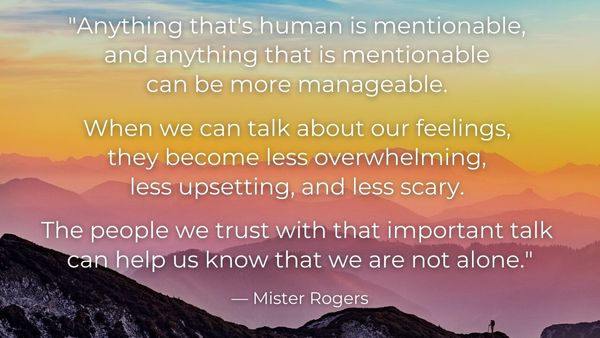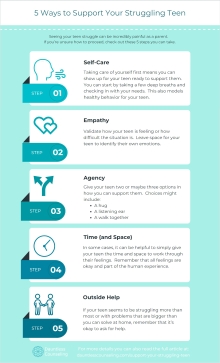Seeing your teen having a tough time can be incredibly painful as a parent. If you’re unsure how to proceed and looking for some simple, but powerful ways you can support your struggling teen, check out these 5 steps you can take.
Table of Contents
The 5 steps can be summarized as Self-Care, Empathy, Agency, Time, and Outside Help. You can use the acronym SEAT-O to remember the steps if that’s helpful. You can also download this PDF quick reference: 5 Ways to Support Your Struggling Teen.

1. Self-Care: Remember to take care of yourself first
It’s important to remember that your own mood and behavior can have a significant impact on your teen. The way you react to a situation can either improve or escalate how your teen is feeling in the moment.
If you come into the situation in a highly charged emotional state, then this is only going to feed into your teen’s difficult emotions. Therefore, if you want to be able to effectively support your struggling teen, then you need to concentrate on taking care of yourself first so that you can proceed with calm and focus.
This step might be as simple as taking a few deep breaths, checking in with your biological needs (did you eat lunch today?), taking a few minutes to yourself, or talking it out with a partner or friend.
Keep in mind that you are modeling for your teen how to handle challenges in life. If you can show them that it’s possible to respond calmly when things are difficult, then you are modeling for them a healthier way to cope.
2. Empathy: Validate how your teen is feeling
Once you’ve taken care of yourself, the next step is to show your struggling teen some empathy.
While from your perspective it may seem like your teen has it good (and therefore has nothing to be upset about), it’s possible that your teen has things going on that you aren’t aware of. This could be anything from a harsh teacher to bullying at school to major anxiety.
It’s also important to note that while an issue may seem insignificant from your perspective, your teen doesn’t have the life experience, and therefore the perspective and coping skills, that you have picked up along the way as an adult. This is why a situation that may seem like no big deal to you may be completely overwhelming or downright painful for your teen.
It’s also good to keep in mind that a teenager’s brain is undergoing some major changes, which is both a good thing and can create its own challenges.
Focus on validating your struggling teen wherever they are at. If they share that they are dealing with a hard situation, acknowledge this difficulty.
Validation might sound like:
- “I can tell that you’re really frustrated.”
- “I’m wondering if you’re feeling overwhelmed.”
- “It looks like you’re feeling really anxious.”
If you’re really not sure what your teen is feeling, you can make a more general statement, like:
- “It seems like you’re having a hard time.”
- “I’ve noticed you don’t seem yourself lately. What’s going on for you?”
Try not to make assumptions about what exactly your teen is feeling and be open to feedback, even if it doesn’t seem accurate to you. If they disagree with the emotion that you chose, you can acknowledge that you were mistaken and leave space for them to identify their own emotion(s).
It will be helpful if your teen has been provided with examples of different feeling words ahead of time. You can stick this Feelings Wheel or this Feeling Faces Chart on your fridge for easy access. This Emotions Magnet is another fun option.
Remember that you can validate emotions without necessarily validating behaviors.
While your teen may or may not be making poor choices or engaging in unwanted behavior, we still want to validate the emotions underneath these behaviors first. Then later, when everyone is feeling calmer, you can have a conversation about rules or unacceptable behaviors, if necessary. Keep in mind that your teen is probably doing the best that they can.
3. Agency: Give your teen a choice in what kind of support they want
If your teen does acknowledge that they are struggling, you can offer them support in a few different ways. Make sure not to overwhelm them with choices. Usually, it’s helpful to offer just two choices, and then maybe a third if they don’t go for one of the first two.
Try not to offer your teen anything that you are secretly hoping they won’t actually choose. They will probably notice your lack of enthusiasm, which will only make them feel worse.
Some options you can give your teen might include:
Let’s talk about each of these options.
A Hug
If your teen is someone who appreciates physical touch, then you can ask them if they would like a hug.
Hugs have been found to release chemicals in the brain that can reduce anxiety and stress. Hold on until they let go. Let your teen dictate the length of the hug.
Once the hug is over, you can ask them if they want you to stick around or if they would prefer space. This gives your teen a chance to practice identifying their needs and setting healthy boundaries in a safe space.
If your teen chooses space, respect their decision and don’t check back in with them too soon. If your teen has self-harmed in the past, do make sure that your teen’s environment is safe before leaving them alone.

A Listening Ear
If you think your struggling teen might want to vent, you can say something like:
“If there’s anything you’d like to talk about, I’m here to listen.”
If they take you up on this offer, be sure to give them your full attention. Show your teen that you’re listening by putting your phone down, turning the TV off, and closing your laptop.
Try not to talk too much. Your teen will be more likely to share if there is silence to fill. Just show them that you care by giving them your undivided attention.
Be mindful that you don’t jump to giving solutions, trying to fix the problem, or why they “should” feel better.
If they specifically ask for help solving a problem, try not to jump in right away with solutions. Ask your teen what they think their options are and if one seems better than the others.
Give them a chance to try (and maybe fail) while they still have the safety net of their family to fall back on. While this can be scary as a parent, letting your teen make their own choices will support them in being able to make decisions for themselves as an adult.
You can also make an intentional effort to acknowledge what your teen is doing well in the situation. Look for the positive, even if it’s just that they shared their struggle with you.
A Walk Together
Another good option can be to offer to go for a walk with your teen.
Walks often provide an opportunity for your teen to open up if they want to, as they may feel less pressured when you aren’t looking at them and have another task to focus on (even one as simple as putting one foot in front of the other).
Physical activity can also boost your teen’s mood and lower their risk for anxiety and depression. Double win!
Another Preferred Activity
Another option is to offer to do something together that you know that your teen enjoys. They may turn you down, or they may surprise you.
“Would you like to do [X] together?”
Examples of this might be playing video games, baking, watching a movie, riding bikes, etc. Engaging in a fun activity can help get your teen out of their head and back into the present.
This can be especially meaningful to your teen if the activity is not your favorite thing (and they know it). This gives you another opportunity to show them how much you care and want to be there for them.
Be sure to give your teen the chance to turn you down if they want to. Forcing the activity on them won’t help anyone.
4. Time (and Space)
In some cases, it can be helpful to simply give your struggling teen the time and space to work through their feelings. Space might be physical space (i.e., letting them be alone in their room) or mental space (i.e., not bringing up the situation again until they do).
The amount of time your teen might need to process the situation can vary greatly depending on your child’s age, developmental level, and the circumstances. Use your best judgement to decide how long that might be.
And remember that all feelings are okay and part of the human experience.
5. Outside Help
If your teen seems to be struggling more than most or with problems that are bigger than you can solve at home, remember that it’s okay to ask for help.
This may be from a spiritual leader, a respected member of your community, a medical doctor, or a mental health provider. Asking for help models for your teen that they don’t have to go it alone and that reaching out takes courage and strength.

Supporting Your Struggling Teen Is Hard!
Watching your teen struggle is hard. Parenting is hard. Don’t forget to give yourself some grace as you and your teen navigate these challenging days.
And if you haven’t already, don’t forget to download the free quick reference guide for these steps by clicking the image below:

As a reminder, this blog post is not intended as professional counseling or clinical advice. This article is meant to provide you with some helpful information on how to support your struggling teen. As mentioned above, if you or your teen are having trouble with your mental health, I encourage you to consider reaching out for additional support, professional or otherwise.

-Kristel Roper, LMFT, LPCC
Kristel Roper is a licensed psychotherapist offering therapy services to individuals in the Sacramento area. She specializes in therapy for anxiety and OCD and especially enjoys working with young adults as they navigate the challenges of college, career, and beyond. If you have a question for Kristel or are interested in therapy for yourself or your loved one, feel free to reach out.
Photo by Peng Louis from Pexels
Image by Simon Berger from Pixabay
Image by Kristel Roper
